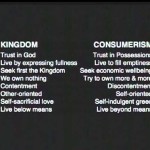We run our website the way we wished the whole internet worked: we provide high quality original content with no ads. We are funded solely by your direct support. Please consider supporting this project.

Rooting Out Our Own Greed
Joshua Becker is a Christian who focuses on a lifestyle of simplicity on his blog Becoming Minimalist. He wrote a book called Simplify: 7 Guiding Principles to Help Anyone Declutter Their Home and Life as well as several other books on this topic. What is refreshing about Joshua’s take on this subject matter is the way that he highlights that a simpler lifestyle can be freeing and can help us to better focus on what is really meaningful in our lives, and he avoids the temptation to be legalistic or rigid.
On his blog today he challenged readers who are angry or discouraged about corporate greed and selfishness to start by examining the ways that they themselves have been selfish or greedy. While these qualities can seem obvious to us in corporations or those around us, it’s sometimes difficult to recognize them in our own hearts.
From the blog post:
Recognizing the negative effects of corporate selfishness is easy. But identifying our own selfish motivation is more difficult to accomplish. It is, after all, far more painful to discover and admit.
As a result, we rarely recognize how selfishness within us is…
- contributing to the feelings of jealousy we experience.
- causing strife in our relationships with others.
- negatively impacting our relationship with our spouse.
- motivating so many of the unhealthy decisions we make with our money.
- preventing us from meeting the apparent needs of others.
- keeping us from experiencing love, joy, hope, gratitude, generosity.
- hindering us from finding true contentment.
Image by David Ohmer. Used in accordance with Creative Commons. Sourced via Flickr.
Category: General
Tags: Greed, Simplicity
Related Reading

The Cost of Holding On
Given Greg’s recent Twitter comments on the question of how we view what we own, we thought this article in the New York Times was particularly timely. What is the cost of holding onto things? As we accumulate more and more possessions, do we pay a price beyond the actual price tag? Although this piece…

Simple Holidays
Lawrence OP via Compfight Here’s a reflection from Joshua Becker on Keeping the Main Thing the Main Thing During the Holidays. From the article: Surely, each of us will define our holiday most important differently. Many will seek spiritual renewal. Some will celebrate family. Some will refocus on giving to others. Some will seek rest. Some will…

Becoming Unbusy
ZeroOne via Compfight Joshua Becker posted A Helpful Guide to Becoming Unbusy that we thought was wonderful. If you’re finding yourself mindlessly going from one task to the next with no time to take a breath, you might want to check this out. From Joshua’s post: But is the state of busy really improving our…

Is America Uniquely Favored by God?
The tendency of wealth to entrap people in greed has been confirmed in numerous studies. Research has consistently shown that, generally speaking, the more people have, the less percentage of their income they tend to give away. This is even reflected on a national level in the case of America. In 2000, the gap between…

Consumer Wars: Sermon Clip
To go along with our other post today, here’s a clip from Greg’s sermon last week. If you don’t have any financial margin in your life, this might have something to do with it. You can find the entire sermon here.

Showing Up
Jonathan Kos-Read via Compfight Shauna Niequist over at Donald Miller’s Storyline blog shared some thoughts on Why You Should Stop Waiting for Life to be Perfect. She points out that sometimes this waiting for perfection gets in the way of noticing the goodness that is already here for you. Show up to your life today, even…
